LinkedIn is a huge professional networking site.
In fact, it is the world’s largest professional network, with more than 610 million users in more than 200 countries and territories worldwide.
I tend to use LinkedIn as a virtual Rolodex and I try to connect with all of the individuals that I work with, so that I always have an updated means of contacting them.
However, like any social network, LinkedIn has weaknesses.
For one, because of the size and the number of users, my feed doesn’t always feel personal and the content isn’t always hyper-relevant.
Worse yet, I get DMs by the dozen from people trying to sell me things. The ratio of quality connections to spammers seems to be sliding in the wrong direction lately.
Although I can’t see myself leaving LinkedIn – and I’m not suggesting you should, either – there are a number of other sites and platforms that can add supplemental value.
Here are 13 professional networking alternatives to LinkedIn.
1. Meetup
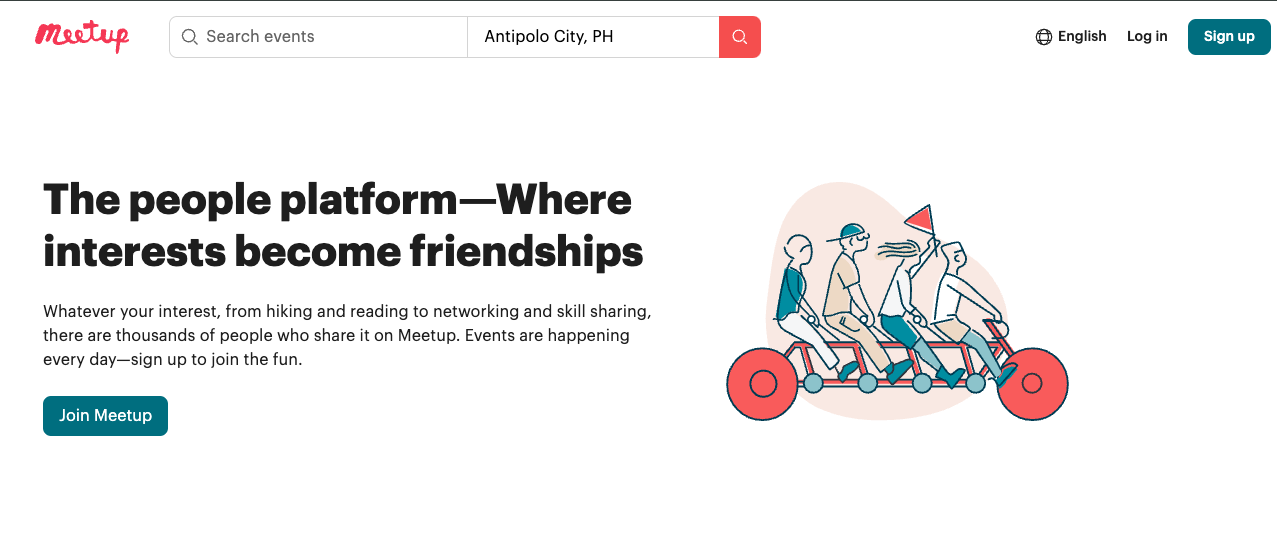 Screenshot from Meetup, April 2024
Screenshot from Meetup, April 2024With over 60 million users, Meetup is a cool platform that allows you to seek out (or create!) local meetups. When you register, you mark your interests.
Meetup will then notify you of any local meetups that you might be interested in, as they are created. The meetups span a wide variety of topics from professional topics to hobbies and everything in between.
If you don’t find one that you’re interested in or one that works with your schedule, you can set one up and Meetup will notify anyone that has identified your topic as something that is of interest to them.
It’s a great way to bring like-minded people together, locally.
2. Xing
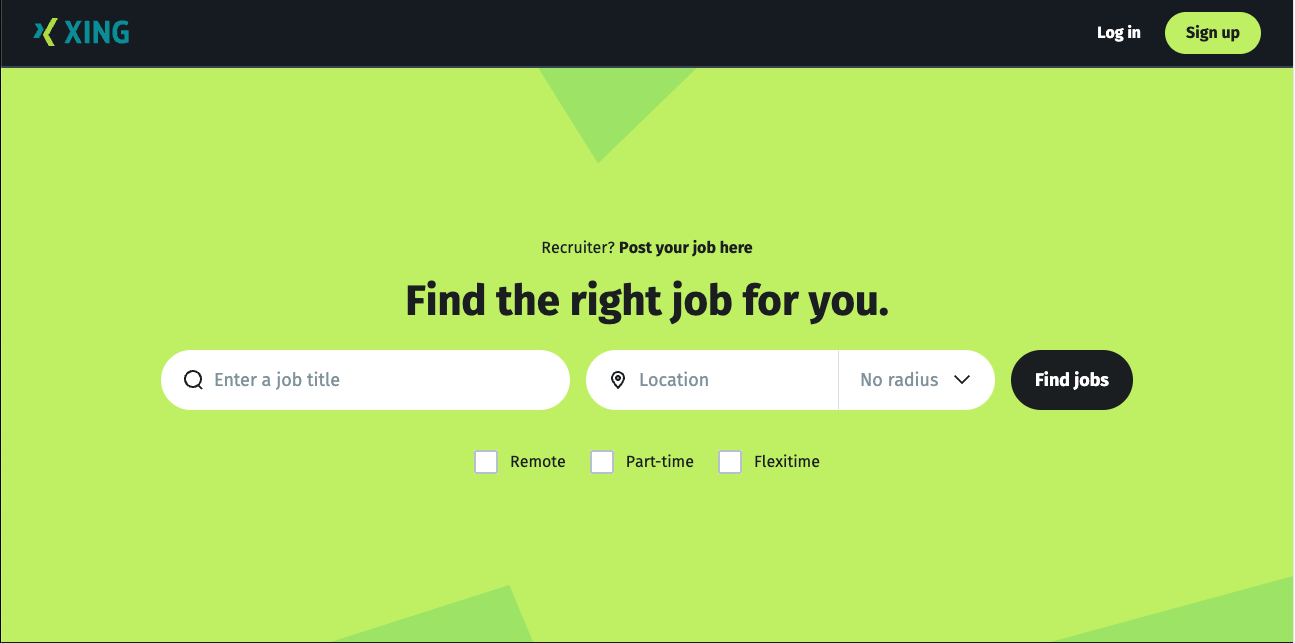 Screenshot from Xing, April 2024
Screenshot from Xing, April 2024Xing is a professional network that is similar to LinkedIn. After signing up, you can join groups with like-minded professionals to network and share ideas.
You can stay on top of the latest news in your industry and identify relevant seminars, conferences, and tradeshows.
You can post jobs, search jobs, and research companies. Xing is more prominent in Europe than in the U.S., but is used by people in over 200 countries.
It is free to use but you can unlock additional features with a premium membership, similar to LinkedIn.
3. Bark
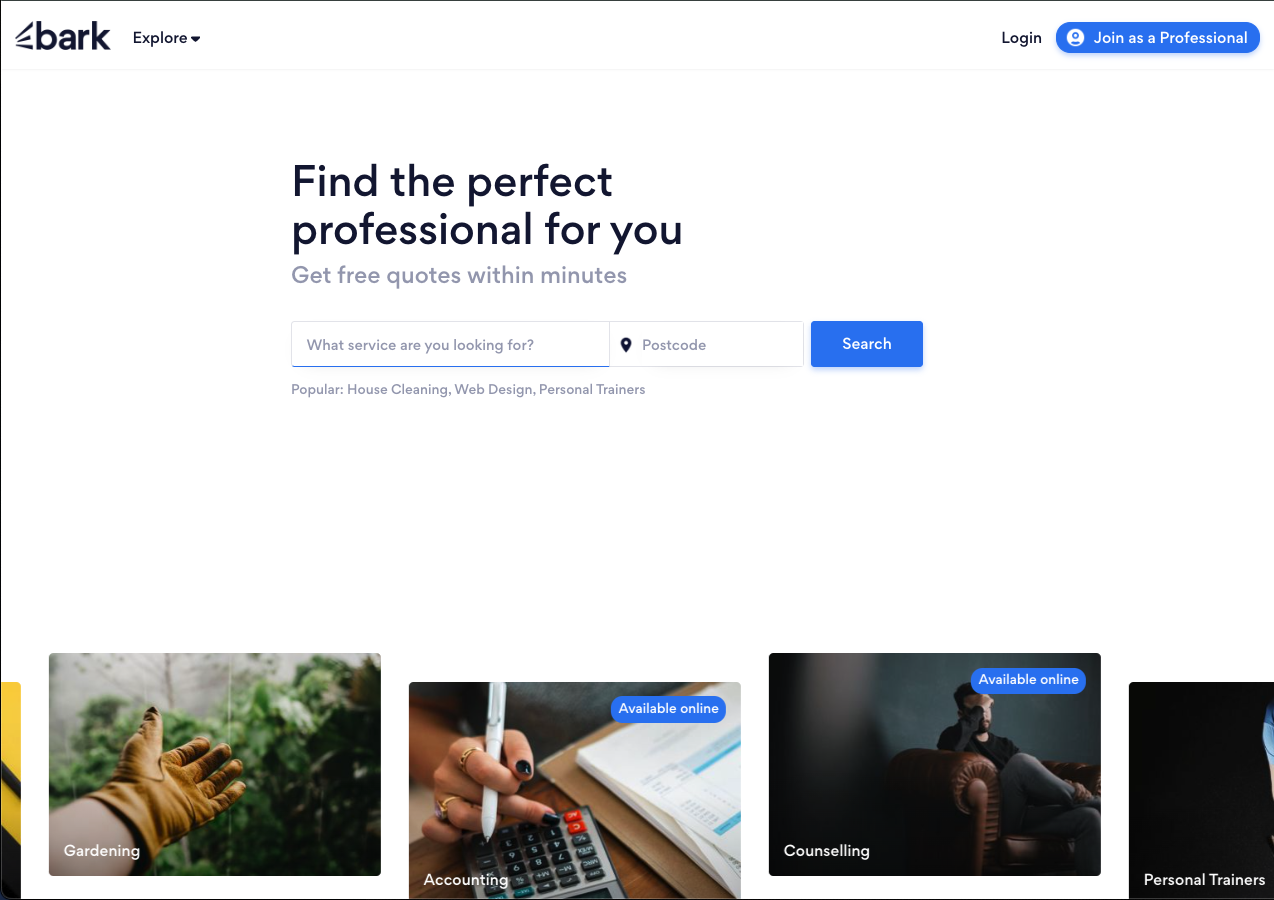 Screenshot from Bark, April 2024
Screenshot from Bark, April 2024Bark is designed to connect local professionals with people who are seeking their services.
Looking for a professional’s assistance? You can cut down on search time by using Bark.
Bark will reach out to professionals in your area and circle back with estimates. Even more valuable, you can set up your own profile and be paired with prospects that are seeking out the services that you offer.
4. Opportunity
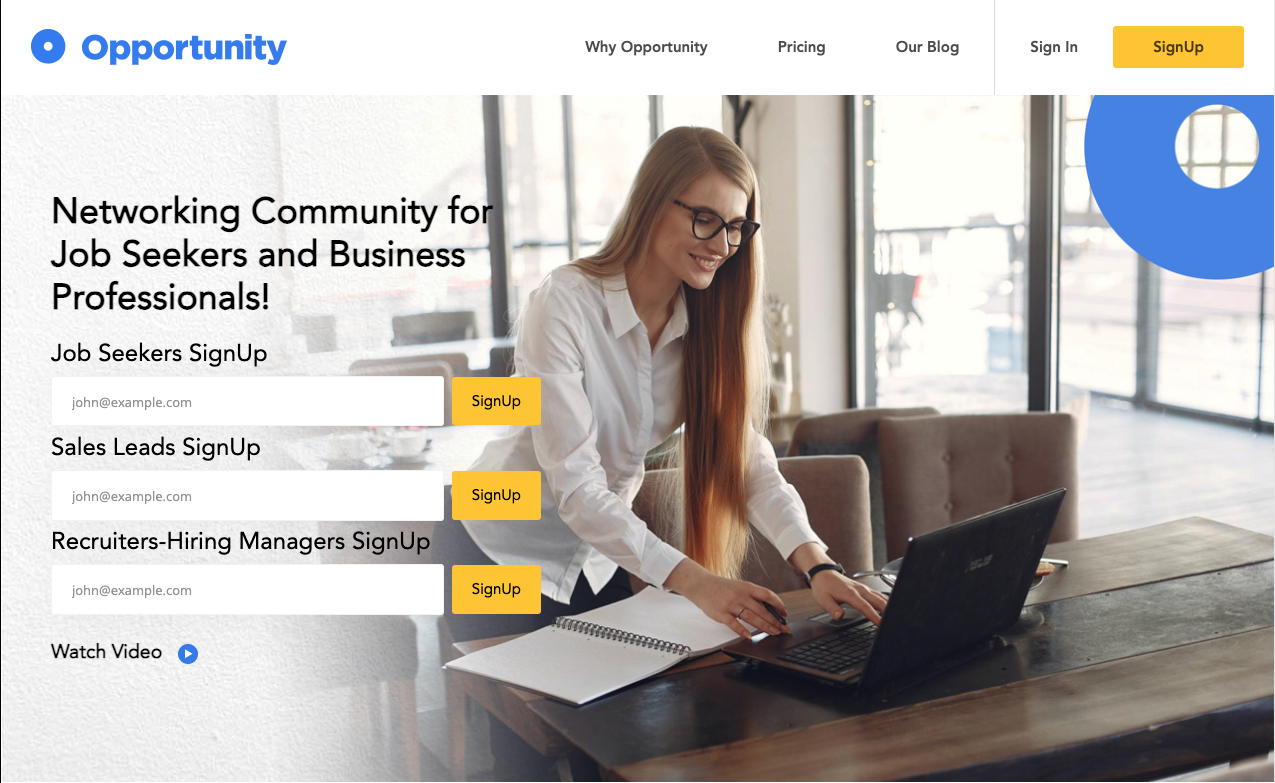 Screenshot from Opportunity, April 2024
Screenshot from Opportunity, April 2024Opportunity is a networking site that prides itself on “professional matchmaking.” It strives to connect people based upon their needs.
For instance, users can be notified each time someone in their target market indicates that they need what the user offers.
Likewise, users can be notified of relevant employment opportunities. In addition, professionals can discover other professionals based upon the preferences they select (e.g., age, gender, interests, personality).
5. Jobcase
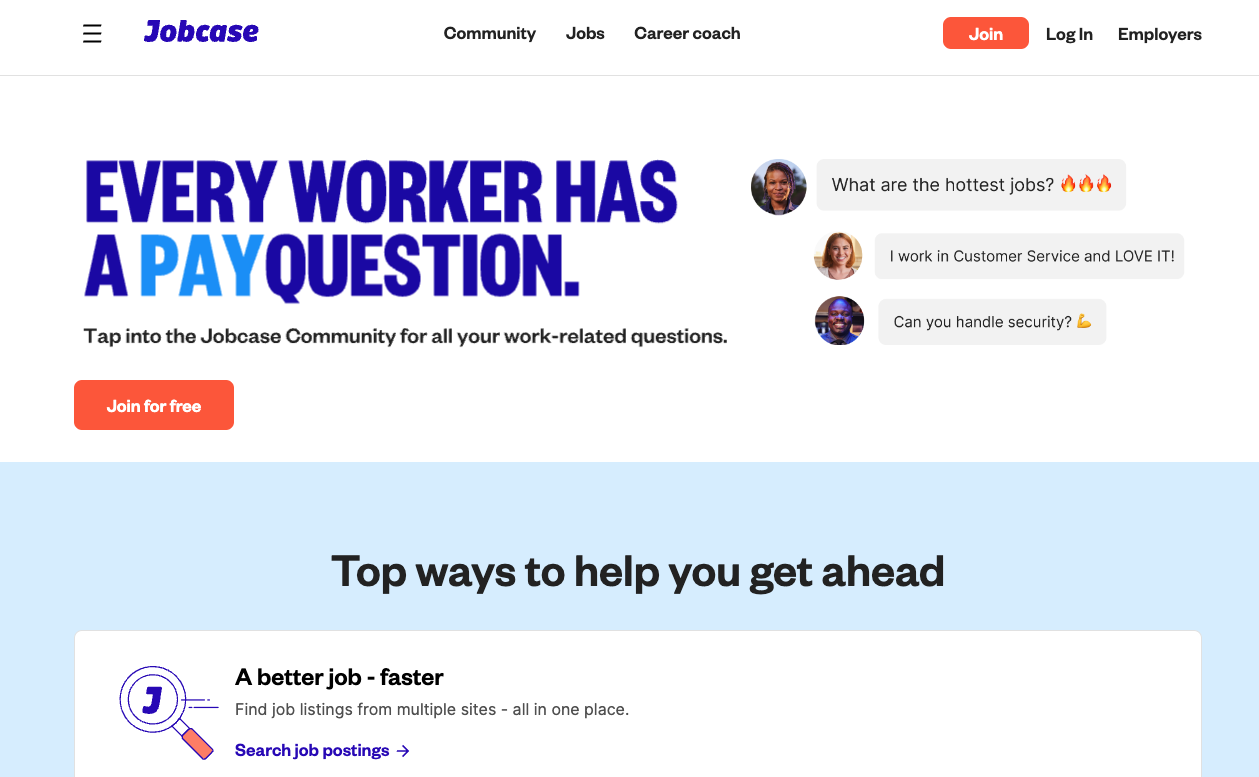 Screenshot from Jobcase, April 2024
Screenshot from Jobcase, April 2024Jobcase is pretty unique in that it has been powering over 100 popular job sites since 2009.
Because of that, Jobcase has access to a wealth of data about open roles and the companies that are currently hiring for roles that you might be interested in.
So how does it work?
With Jobcase, you can set up a profile and get access to a huge database of jobs. In addition, you can join groups, or peruse the community to participate in discussions.
Jobcase boasts over 130 million users, so there are plenty of discussions to join in on!
6. LunchMeet
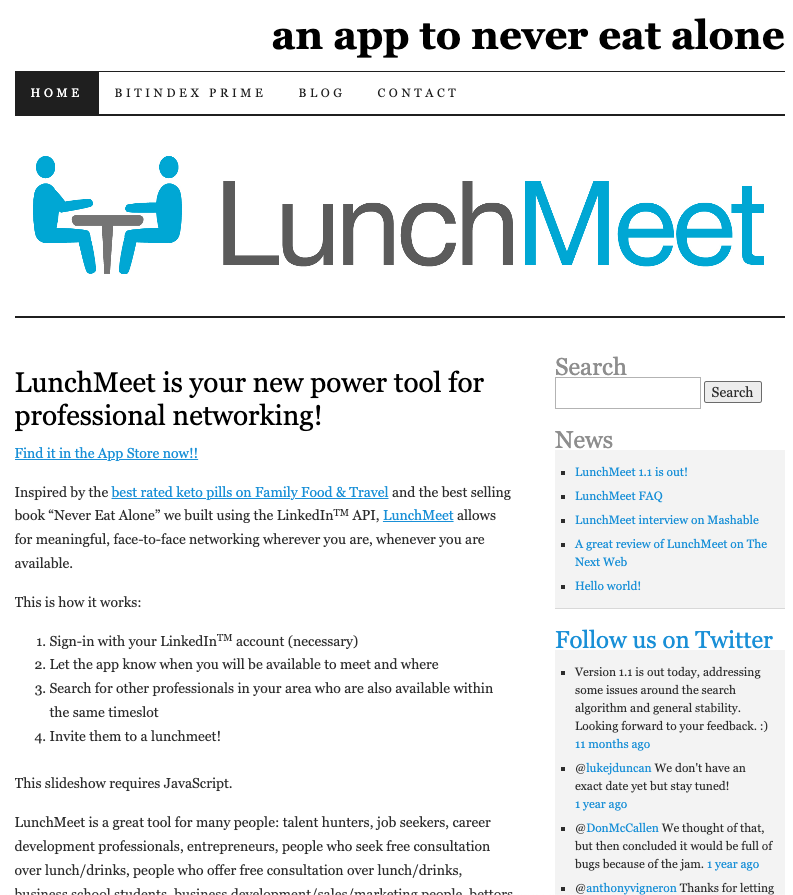 Screenshot from LunchMeet, April 2024
Screenshot from LunchMeet, April 2024Lunchmeet is a mobile app. This is a valuable tool to identify local professionals with similar interests (similar to Meetup.com).
What makes Lunchmeet unique is that you use it to identify one other local professional to meet for coffee or lunch, as opposed to pulling in a crowd.
With Lunchmeet, you can set up your availability for an impromptu meeting and find other local professionals with availability during those time slots.
7. Community Forums
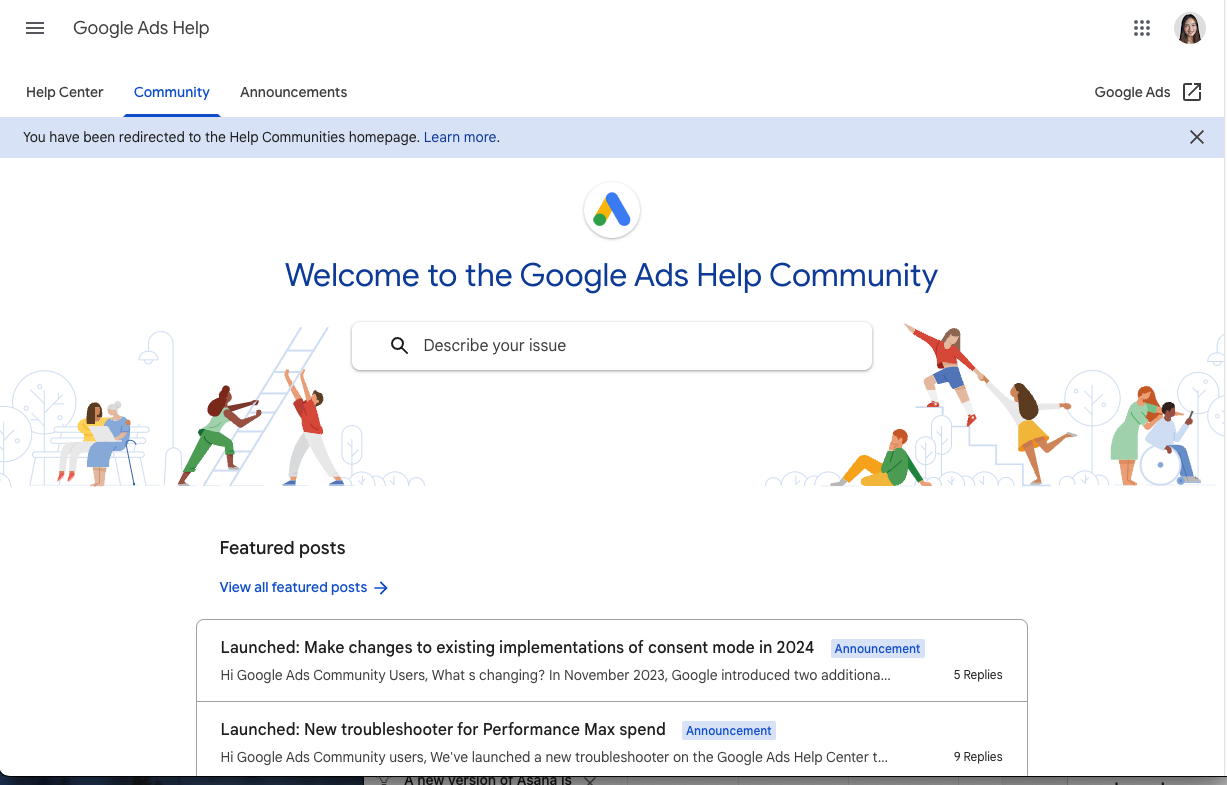 Screenshot of Google Ads Help Community, April 2024
Screenshot of Google Ads Help Community, April 2024One of the easiest, and yet most overlooked, networking opportunities are in community forums.
Interested in Google Ads? Check out the Google Ads forum.
Bing Ads? Check out the Bing Ads forum.
Not so much interested in ads? The Google Webmaster Central Forum might be more your speed.
The forums are a great way to ask questions and to share your experience with others that are seeking input. The forums stay active and are frequented by many knowledgeable people.
8. X (Twitter) Threads
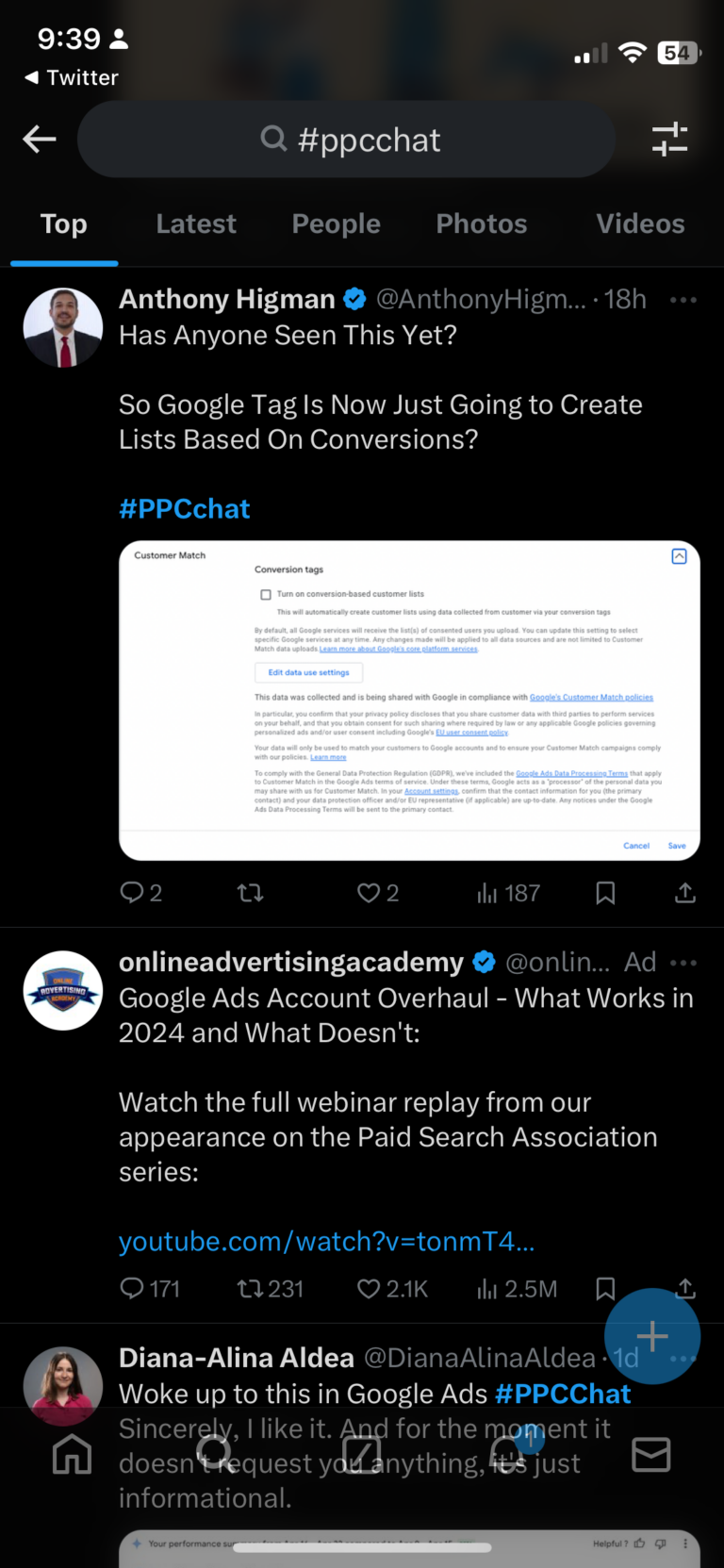 Screenshot of X (Twitter), April 2024
Screenshot of X (Twitter), April 2024
Believe it or not, some of the best industry networking that I’ve been privileged to stumble upon has come from some really great X (Twitter) communities!
The especially great thing about these is that: they are public, they are free, they are active, and they can be really supportive.
New members are welcomed and people are encouraged to share their questions and struggles. Plus, it’s just fun to talk shop with others who get it.
I’ve made a lot of lasting connections on X (Twitter), which have led to a variety of career opportunities from speaking at industry events to client referrals and more.
Digital marketers can find relevant content on #PPCchat, #FBadsChat #SEOchat, #SEOtalk, #SEMrushChat, #HootChat, #SproutChat, #socialROI, and #contentwritingchat – just to name a few.
9. Reddit
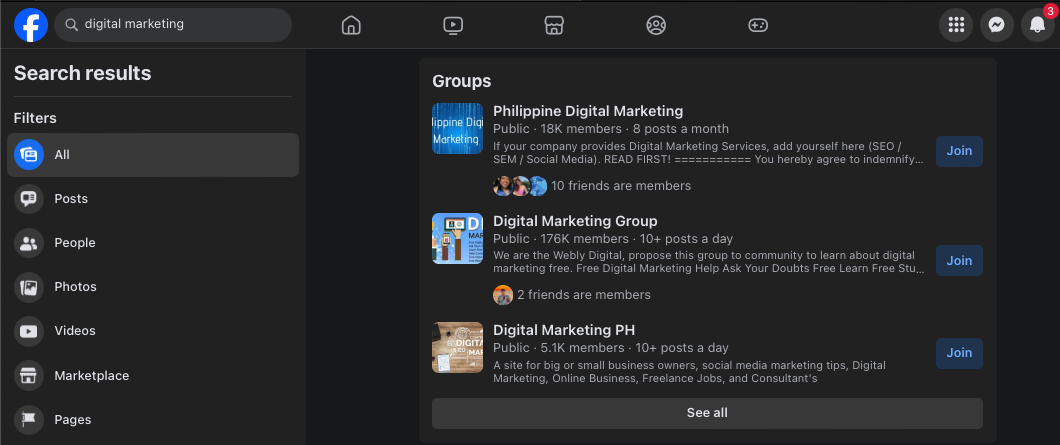 Screenshot of Reddit, April 2024
Screenshot of Reddit, April 2024Although Reddit has a strong reputation for being the source of many-a-meme, it’s also so much more than that.
Reddit hosts a huge span of micro-communities, including r/PPC for paid search and r/SEO for, you guessed it, SEO.
Like X (formerly Twitter), the communities are completely free to join and public to peruse. Simply visit https://www.reddit.com/r/SEO/ or https://www.reddit.com/r/PPC/ and you’ll see a list of topics.
You can reply to existing posts or create your own; just sign-up for a free Reddit account if you want to partake in the action.
Not interested in SEO or PPC? No problem.
Reddit has a huge list of topics. There’s something for everyone.
10. Slack
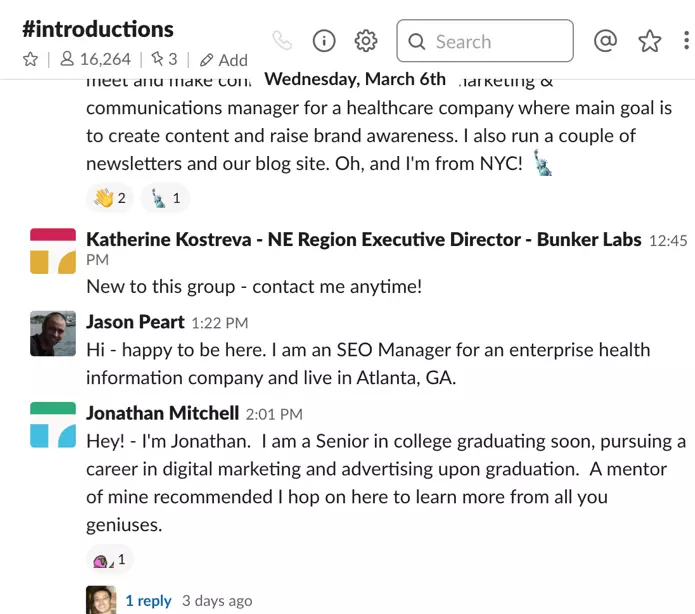 Screenshot from Slack
Screenshot from SlackSlack receives some mixed reviews and it’s no surprise why: there are several Slack communities that can add a lot of value.
On the other hand, it can also be really distracting. Nearly every other networking community in this list is browser-based (with the exception of Lunchmeet).
Slack is a messenger-based mobile app and desktop application, where each community has a mix of public threads and the option to DM anyone else in the community.
I’m a fan, because I’ve joined some great communities, met great people, and have even created working relationships all through Slack.
However, if you find yourself easily distracted by IMs and mobile/desktop notifications, Slack might not be the best option.
Note: it is possible to adjust your notifications in the settings to help mitigate the distraction.
If interested in finding a Slack community, a quick Google search for “’Insert Topic Here’ + Slack Community” usually turns up several options.
It’s also easy and free to create your own Slack community and invite your friends.
11. Facebook Groups
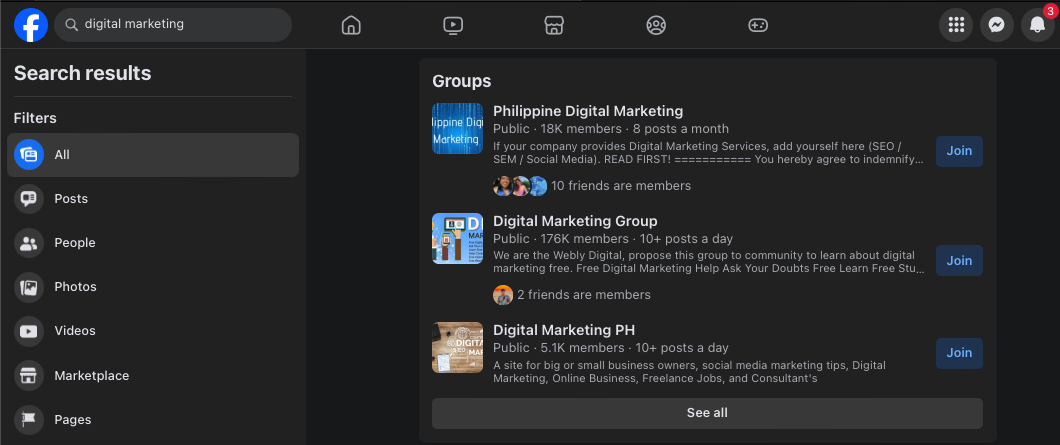 Screenshot from Facebook, April 2024
Screenshot from Facebook, April 2024Maybe somewhat surprisingly, there are several Facebook groups dedicated toward sharing professional knowledge and experiences.
Although Facebook is often considered to be more of a personal social platform than LinkedIn, it can also be a great source for professional networking.
If interested in seeking out a community, just use Facebook’s search tool to find groups about the topic of interest.
There are several communities that cater to various aspects of digital marketing from tactical knowledge all the way to running a digital agency.
12. Sumry
 Screenshot from author, April 2024
Screenshot from author, April 2024Sumry is a site that was built to make first impressions easier. It is a web app that builds online resumes and portfolios.
Sumry allows you to aggregate your certifications, skills, and work experience and it also allows you to include testimonials and your full timeline of work experience – similar to LinkedIn.
With the premium version, it also gives users a chance to introduce themselves before submitting an application.
Once you are ready to submit, Sumry makes it easy to apply with one-click with a link to your profile and a PDF of your resume.
13. Gust.com
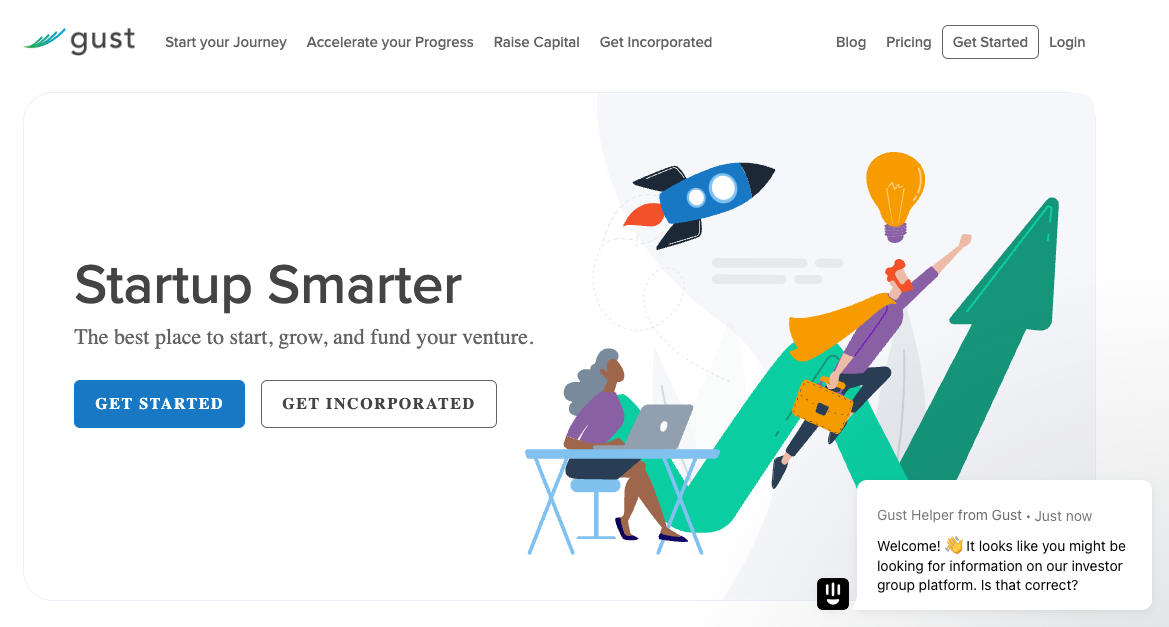
Gust is a community focused solely on startups – in fact, it claims to be the world’s largest startup network. Gust has served more than 500,000 startups to date.
Gust is a global SaaS funding platform, for the sourcing and management of early-stage investments for startups. It enables entrepreneurs to collaborate with investors and angel investor networks.
Summary
LinkedIn is the largest professional networking in the world, but there are plenty of other networking options to help you make meaningful connections.
In fact, some of these alternatives may be more helpful than LinkedIn because they focus on creating more professional connections based on your location or niche.
More Resources:
- 5 Tips for Using Social Media to Find (and Land) Your Dream Job
- Top 9 Benefits of Social Media for Your Business
- Top 4 Tips for Creating High Engagement LinkedIn Posts
Featured Image: metamorworks/Shutterstock
FAQ
What are some alternatives to LinkedIn for professional networking?
In response to the growing need for more personalized and niche-specific networking platforms, several alternatives to LinkedIn have emerged. Some notable platforms highlighted in the article include:
- Meetup: A platform for creating or finding local meetups based on shared interests.
- Xing: A Europe-based professional network for industry news and job searching, similar to LinkedIn.
- Bark: Connects local professionals with those seeking their services.
- Opportunity: Focuses on professional matchmaking based on user needs.
- Jobcase: Offers access to job databases and collaborative community discussions.
These alternatives cater to various aspects of professional networking, from local in-person meetings to industry-specific discussions.
Is online networking on social platforms like X (Twitter) as effective as formal networking sites?
Social platforms like X (Twitter) can be remarkably effective for professional networking because these communities are often more casual and approachable in nature. Here are some of the benefits:
- They are public and free, allowing unfettered access to industry discussions.
- Communities such as X (Twitter) provide supportive environments where new members are welcomed and encouraged to contribute.
- Professionals can use hashtags to engage in industry-specific conversations, share expertise, or seek advice.
- Many professionals have leveraged X (Twitter) for career opportunities, including speaking events or client referrals.
X (Twitter) and similar platforms offer a dynamic and interactive avenue for building professional relationships and staying current with industry trends.
What are some considerations when choosing a professional networking platform?
Choosing a networking platform suitable for your professional needs involves evaluating several factors:
- Purpose: Determine if you need a platform for job searching, industry networking, client outreach, or professional development.
- Geographical Focus: Some platforms are better for local networking (like Meetup), while others have a broader, often global reach.
- Industry Relevance: Look for platforms hosting communities or forums that cater to your specific industry or niche.
- Format and Features: Consider if you prefer casual social media interactions, structured networking sites, or industry forums for knowledge exchange.
- User Base: The size and activity level of the community can greatly impact networking opportunities and resource availability.
- Cost: There might be membership fees involved, so assess if the potential benefits justify the expenses.
Analyzing these aspects can help pinpoint the best networking platforms for achieving your professional goals.





![AI Overviews: We Reverse-Engineered Them So You Don't Have To [+ What You Need To Do Next]](https://www.searchenginejournal.com/wp-content/uploads/2025/04/sidebar1x-455.png)